In a fiery segment on GB News, host Patrick Christies took aim at the Duke and Duchess of Sussex, accusing them of hypocrisy for their use of private jets while championing environmental causes.
His critique was sharp and unrelenting, highlighting the glaring contradictions between their lavish lifestyle and their public commitments to sustainability.
Christies specifically pointed to the couple’s Netflix series centered around polo, branding it as a quintessentially luxurious pastime reserved for the wealthy elite.
He argued that this show epitomizes a life focused on wealth and status, further illustrating what he sees as the couple’s disconnection from the very issues they profess to support.
The crux of Christies’ argument lies in the inconsistency of their actions versus their advocacy for environmental awareness.
He suggested that while the Sussexes promote eco-friendly practices, their personal choices tell a different story.
“It’s easy to call Elton John and ask him to plant trees for you,” he remarked, insinuating that such gestures may be more about appearances than genuine commitment.
Meghan Markle‘s travel habits were a particular focal point in Christies’ remarks.
He bluntly stated, “They’re just hypocrites,” implying that the couple’s actions do not align with the values they espouse.
This pointed critique has sparked significant discussion about the couple’s credibility as advocates for environmental issues.
In the wake of Christies’ comments, royal journalist Ellen Coughlan stepped in to defend the Sussexes’ travel choices.
She argued that for high-profile royals, a substantial carbon footprint is often unavoidable.
Coughlan noted that this reality extends to other senior royals, including William and Kate, as well as King Charles and Queen Camilla.
Coughlan elaborated on the couple’s travel habits, referencing Harry’s past statements about their flight choices.
According to her, Harry has mentioned that they fly commercial 99% of the time, reserving private jets for specific circumstances.
This perspective suggests that while private travel does occur, it is not as frequent as critics might imply.
Moreover, Coughlan emphasized the couple’s genuine commitment to environmental responsibility.
She pointed out that they actively offset their carbon emissions and engage in various initiatives aimed at promoting sustainability and raising awareness about climate change.
This dedication indicates a proactive approach to mitigating their environmental impact.
Coughlan also highlighted that environmental concerns are a shared priority across the entire royal family.
“We all know they’re all really prominent in the space of global warming,” she stated, suggesting that the challenge of balancing public duties with environmental responsibilities affects the entire royal household.
As the debate unfolds, it becomes evident that the discussion surrounding the Sussexes’ lifestyle choices and their environmental advocacy touches on broader themes of accountability and celebrity culture.
The complexities of modern royal life create a challenging landscape for public figures like Harry and Meghan, who must navigate their roles as advocates for change while managing the realities of their privileged existence.
This ongoing dialogue raises questions about the expectations placed on high-profile individuals regarding their environmental impact.
As public figures, the Duke and Duchess of Sussex find themselves in a delicate balancing act that continues to provoke discussion and controversy in the media.

